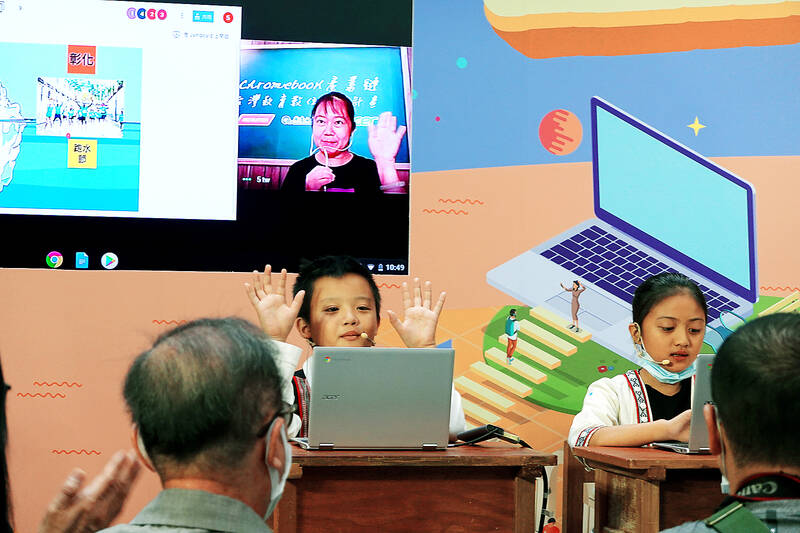Global Chromebook shipments plunged 48 percent year-on-year to 19.2 million units last year, as consumers tightened their belts amid an economic downturn, International Data Corp (IDC) said in a report on Friday last week.
Total shipments plummeted to 19.2 million units from 2021, when sales surged 180.5 percent year-on-year to 36.9 million units, bolstered by demand for remote learning at the height of the COVID-19 pandemic, IDC said.
Fourth-quarter shipments declined 24.3 percent from a year earlier to 3.6 million units, marking six straight quarters of declines, as PC sales came under pressure from weaker work-from-home and online learning demand as the COVID-19 pandemic eased, IDC data showed.

Photo: Bill Chen, Taipei Times
Even though the pandemic has brought about positive changes to Chromebook adoption and market watchers believe such devices would continue to play a fundamental role in education, consumer spending has weakened in the face of a slowing economy and still-high inflation worldwide.
“While Chromebooks have faced a tough few quarters, the excess channel inventory that had built up is starting to subside and could potentially lead to more normalized growth in the coming quarters as back-to-school season returns,” IDC mobility and consumer device research manager Jitesh Ubrani said in a statement.
“However, any traction that Chromebooks made outside the education sector will continue to suffer, as the economy stalls and as tablets and PCs supplant Chrome-based devices,” Ubrani said.
PC vendor Acer Inc (宏碁) last year ranked first in the global Chromebook market, although the company only shipped 4.2 million units, 33.8 percent less than a year earlier, IDC data showed.
That gave the Taiwanese firm a 22 percent market share in the year, up from 17.3 percent in 2021.
Dell Technologies Inc was second with shipments of 4.1 million, down 24.3 percent from the previous year, for a market share of 21.3 percent.
Lenovo Group Ltd (聯想) placed third with 3.7 million units, dipping 54.4 percent year-on-year, for a market share of 19.5 percent.
HP Inc ranked fourth, with shipments of 3.5 million units, down 65.6 percent, followed by Asustek Computer Inc (華碩), which shipped 1.3 million units, 20.9 percent less than in 2021, IDC data showed.
The two secured market shares of 18.4 percent and 6.8 percent respectively, IDC said.

CAUTIOUS RECOVERY: While the manufacturing sector returned to growth amid the US-China trade truce, firms remain wary as uncertainty clouds the outlook, the CIER said The local manufacturing sector returned to expansion last month, as the official purchasing managers’ index (PMI) rose 2.1 points to 51.0, driven by a temporary easing in US-China trade tensions, the Chung-Hua Institution for Economic Research (CIER, 中華經濟研究院) said yesterday. The PMI gauges the health of the manufacturing industry, with readings above 50 indicating expansion and those below 50 signaling contraction. “Firms are not as pessimistic as they were in April, but they remain far from optimistic,” CIER president Lien Hsien-ming (連賢明) said at a news conference. The full impact of US tariff decisions is unlikely to become clear until later this month

With an approval rating of just two percent, Peruvian President Dina Boluarte might be the world’s most unpopular leader, according to pollsters. Protests greeted her rise to power 29 months ago, and have marked her entire term — joined by assorted scandals, investigations, controversies and a surge in gang violence. The 63-year-old is the target of a dozen probes, including for her alleged failure to declare gifts of luxury jewels and watches, a scandal inevitably dubbed “Rolexgate.” She is also under the microscope for a two-week undeclared absence for nose surgery — which she insists was medical, not cosmetic — and is

GROWING CONCERN: Some senior Trump administration officials opposed the UAE expansion over fears that another TSMC project could jeopardize its US investment Taiwan Semiconductor Manufacturing Co (TSMC, 台積電) is evaluating building an advanced production facility in the United Arab Emirates (UAE) and has discussed the possibility with officials in US President Donald Trump’s administration, people familiar with the matter said, in a potentially major bet on the Middle East that would only come to fruition with Washington’s approval. The company has had multiple meetings in the past few months with US Special Envoy to the Middle East Steve Witkoff and officials from MGX, an influential investment vehicle overseen by the UAE president’s brother, the people said. The conversations are a continuation of talks that

Alchip Technologies Ltd (世芯), an application-specific integrated circuit (ASIC) designer specializing in artificial-intelligence (AI) chips, yesterday said that small-volume production of 3-nanometer (nm) chips for a key customer is on track to start by the end of this year, dismissing speculation about delays in producing advanced chips. As Alchip is transitioning from 7-nanometer and 5-nanometer process technology to 3 nanometers, investors and shareholders have been closely monitoring whether the company is navigating through such transition smoothly. “We are proceeding well in [building] this generation [of chips]. It appears to me that no revision will be required. We have achieved success in designing